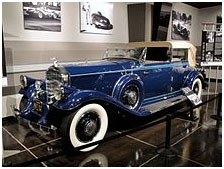No matter how much you try to resuscitate it, sometimes you have to admit that your classic car is dead. It's a sad day when you have to do this, but it's not always possible to safe your beloved vehicle. This may be true of a junker you bought thinking you could repair it, or it might be true of one of the classic cars you purchased at an auction and painstakingly restored only for something horrible to happen. No matter what, you can only hope your vintage car insurance will cover it. If you're wondering if your classic car is reaching the end of its life, here are a few signs to look for.

- You go to buy parts for the car and are told that they've been discontinued. This makes it difficult to find what you need to keep your baby running. While it's not an immediate problem, over time, the lack of easy-to-get parts will become an issue. Eventually, you won't be able to find brand new parts.
- Eventually, you might replace the entirety of the vehicle. When this happens, you've got to realize that your classic car is gone--you've got something that looks just like it, but it's brand new! One of the biggest reasons this happens is damage to the frame or undercarriage. These types of major repairs can be done, especially if your classic car insurance pays for it, but they might mean your classic car isn't quite as classic as it looks.
- Rust can be another classic car killer. In some cases, you almost have to simply replace the panel, which goes back to the point above. While you may be able to find some replacement parts from other damaged vehicles, you can't count on it.
- Another issue you might come up against is the need for specific tools for your make and model. Some of these tools are rare, leaving car collectors to try to create something that does the job. These makeshift tools may actually damage the car, though, and that type of damage isn't usually covered by insurance.
- Just like parts, your tires may also be discontinued. If you can't get the right wheels or tires for your car, you may not be able to drive it any longer. Your other option would be to use different wheels, which means the car won't be 100 percent classic.
- Gas may be an issue is older vehicles, especially as more and more places start offering fuel with ethanol in it. Classic cars can't handle this type of fuel. Make certain you put the correct gas in your vehicle, or you'll ruin the engine. Car insurance won't help you if you've done the damage yourself.
- The cost of car insurance itself can also indicate when your classic car should be retired. In this case, it's more of an indication of which your budget can no longer cover the cost of your vehicle. Many of the classic insurance policies are costly. Of course, to not have one of these policies invites disaster. Your classic car is an investment, after all, and must be protected.
